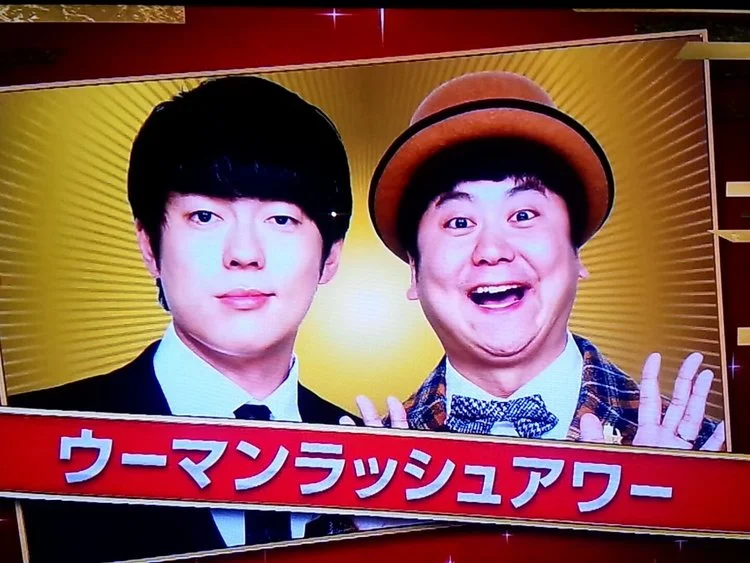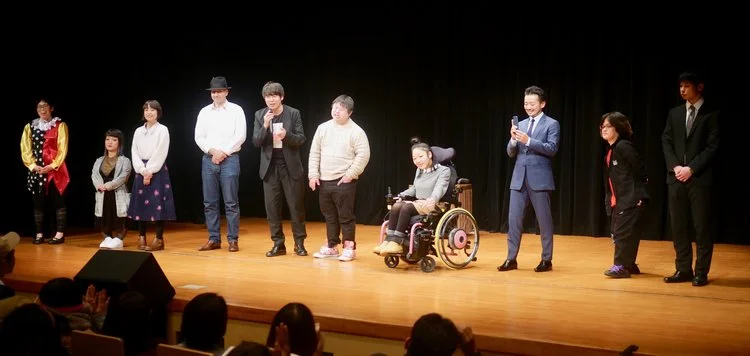Zainichi Comedic Duo Tries to Navigate the Minefield of Japan-Korean Relations
Zainichi manzai duo Korean Chop Squad (picture source)
Inserting politics into a comedic routine can be a tricky feat, especially when it involves a country that at times has had a hostile relationship with the country you are performing in. Such is the challenge for the manzai duo Korean Chop Squad (コリアンチョップスクワッド). The duo is made up of Chisu and Yugyon, both Koreans in Japan, part of an ethnic group commonly known as Zainichi Kankokujin (or simple Zainichi). Zainichi Kankokujin makes up the second-largest minority group in Japan (apron. 855,000) and their history, like the history of the relationship between Japan and South and North Korea is a complicated one. Basically, the group is made up of long-term Korean residents of Japan who can trace their roots back to Korea under Japanese rule (1910-1945). Many of them have lived in Japan for their entire lives. (For a longer look at the history of Zainichi click here.)
Zainichi have faced various forms of discrimination in Japanese society and the tenuous relationship between Japan and both South and North Korea has made life for this group difficult, to say the least. The tension between the countries because of the constant threat of nuclear war with North Korea, the kidnapping of Japanese nationals by the North, as well as the issue of Korean comfort women from South Korea are just some of the reasons for the resentment felt by some Japanese. Therefore, it was natural that the existence of the manzai duo of Korean Chop Squad made news in Japan. I came across them when they were featured on the top page of Yahoo! Japan recently and have been fascinated with their choice of comedic material since. In the feature article on Yahoo! (from the magazine SPA!) the duo describes how their experiences as 3rd and 4th generation Zainichi in Japan when coming up with their routine. They talk about openly wondering how to make their experiences and the various trouble between Japan and the Koreas into routines that will make Japanese laugh.
(It should be noted that, in general, Japanese comedians go out of their way to not touch on subjects that may make audiences uncomfortable such as politics, discrimination, etc.)
Below you can see a clip of their routine entitled “Baito saki” (At my part-time job). Because of the coronavirus, unfortunately, they performed the routine without an audience. This robbed me of seeing how an actual Japanese audience would react to their material. (Also, with social distancing, the two comedians had to stand apart with a plastic partition between them) In the routine, when talking about the topic of their part-time jobs, one of the comedians reveals that he hasn’t “come out” as Zainichi to his workplace.
And if there was any doubt that Korean Chop Squad has a difficult road ahead of them, one only has to look at the comment section of the feature article on them on Yahoo! Japan. Whereas your average article on the site would feature maybe a couple of hundred comments, this piece warranted over 4,200 responses.
Here is a sampling of the comments: (Links to some of the issues addressed added to give context)
“It’s a mystery why you emphasize the fact that you’ve never been to Korea and why you don’t just naturalize (take Japanese citizenship). Is your home country important? Is your Korean identity? Then you should go back to your home country. With the countries around us becoming this dangerous, I think the Koreans in Japan should make it clear and either go back to their home country or naturalize. If there’s a battle with China about the Senkaku islands, Korea will surely side with China. You should do so for yourself, not just because of discrimination but for your own safety. I don’t think you have much time.”
“If you were born and raised in Japan, rather than such an in-between existence, you should choose properly your nationality and choose which country to be in.”
“In the end, aren’t you just dissing Japan by doing a routine talking about your dissatisfaction with the country?”
“Japan’s a great country, isn’t it? After all, you guys can perform your manzai here. You couldn’t do that over there, right?”
“To be honest, there’s no point in doing such comedy in Japan. I’d like you to try that in your own country and re-import the reaction you get from it.”
“I haven’t seen your manzai but I wonder what kind of reaction you’ll get from Japanese, empathy or negative feeling, with issues like free tuition for Korean schools, the rocket launches, the kidnapping of Japanese by North Korea, and the relationship between South Korea and Japan right now. I think most Japanese will feel the latter (negative feelings).”
“I can't laugh. I can't laugh because I'm pulled back to the reality of Japan-Korea relations. I think a big part of the meaning of comedy is that it makes people laugh and escape from reality for a moment, so I think that these kid's manzai has no meaning and value as comedy. If you have a good relationship between Japan and South Korea, you can laugh even with irony or satire, but unfortunately the relationship between Japan and South Korea is not that warm.”
“It’s a pity that the relationship between Japan and South Korea has deteriorated so dramatically, but we don’t need a bridge between the two. The national motto of anti-Japan sentiment has been imprinted in the 75 years since the war…A good relationship between the two countries is simply a dream within a dream, an empty theory. South Korea is a place where some people are told to hold a grudge for 1000 years. While we are alive, imrpoving the relationship is absolutely impossible.”
“Are you really aiming to improve Japan-Korea relations? I’m sorry, but I think you’re only using this as a topic. I feel like if there’s something you don’t like you just you call it “distrimination!” You should change your name to “haremono” (swelling).”
Personally, I admire them for trying to do something so different and challenging in the Japanese comedy world. It will be interesting to see they develop their material and approach to this difficult topic in a humorous manner.






